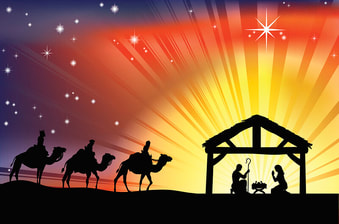|
By Nicholas Anton  When the Incarnate Christ is baptized in the Jordan River, the Holy Spirit descends and the Father proclaims, “this is my Son, the Beloved, with whom I am well pleased” (Matthew 3:17). In this moment, God is revealed as Trinity: three persons, one essence. This is why the Feast that commemorates Christ’s baptism is called Epiphany (or Theophany), which translates from Greek as the illuminating revelation of God. The annual Celebration of Epiphany concludes and culminates the Twelve Days of the Nativity of Christ. The revelation itself happens after His baptism rather than at His incarnation. Why? The Incarnation of Christ is a piece of the larger puzzle whereby Christ fully takes on human nature; it is just one piece of the whole creation. However, through His baptism in water, the symbol for all creation, Christ takes on its totality. Thus, the revelation of God shows us that all things are encompassed in God – not just material things, not just plants, not just animals, and, of course, not just humans. Indeed, this extremely important moment reveals the Trinity setting in motion a divine plan for the ultimate restitution of God’s relationship with all things and all people. At this point, you are likely wondering why I am dropping all this theology on you. Bear with me and you’ll find out! Despite the clear revelation of God as redeemer of all, we humans do not live up to our vocation and obligation, as the creatures made in His image, to be Stewards of Creation. We pollute the very symbol of creation and life – namely, water – through dumping waste and fracking for energy. We dehydrate the earth, causing dry forests ripe for fires. We take more trees than we plant and desecrate the soil with chemicals and genetically modified organisms. Even as creation itself rebels from years of abuse with pandemics and powerful and volatile weather patterns, we refuse to reevaluate our role in the big picture and right the relationship. We have lost sight of Epiphany and perverted the meaning of the Incarnation by perceiving humanity as superior to creation, which we ultimately enslave rather than protect. Therefore, as we celebrate this important Feast, we should take time to reflect on what we can do to be better Stewards of Creation. We can start small: for instance, by ensuring our online orders come in one shipment rather than many; by using reusable “things” in all aspects of life and using them as long as possible before replacing them; by using solar chargers and other zero emissions forms of energy; by driving less; by moderating consumption and avoiding private water sources. Then we can go big: for instance, by adding solar panels to our homes; by driving hybrid or electric vehicles; by insulating our walls and windows to decrease energy usage for heating and cooling; by planting as many trees as possible. Eventually, we can advocate for measures to expand clean energy and better protect God’s creation. All it takes to start is a slight modification of our habits. When our worldview begins with the Incarnation, revealed at Christ’s Nativity and Baptism, and culminates in the Crucifixion and Resurrection, then we know that: “God so loved the world that he gave his only Son, that whoever believes in him should not perish but have eternal life” (John 3:16). Then we appreciate that the least we can do with our lives is to sacrifice as much as possible, both individually and as collectively as a community and society for the sake of all of God’s Creation. Nicholas Anton is with the Greek Orthodox Archdiocese of America, and a board member of Creation Justice Ministries.
0 Comments
Your comment will be posted after it is approved.
Leave a Reply. |
About this BlogThis blog shares the activities of Creation Justice Ministries. We educate and equip Christians to protect, restore, and rightly share God's creation. Archives
July 2024
Categories
All
|
Photo from johndillon77
 RSS Feed
RSS Feed